Helping your living children grieve
Excerpts from “Support for Living Children” by Cathi Lammert, RN
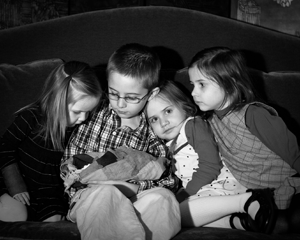 “Most children who have a sibling that dies due to a pregnancy loss, stillbirth or in the first few months of life will experience a grief reaction. However, often times, their grief is overlooked or discounted. Parents may be so overwhelmed by their own grief that they are unable to assist their children with their issues. Parents often ask me “Will my child be negatively affected by the death of their baby sibling?” I have to say the answer to this question is, ‘Usually not, if the child’s grief is acknowledged.'”
“Most children who have a sibling that dies due to a pregnancy loss, stillbirth or in the first few months of life will experience a grief reaction. However, often times, their grief is overlooked or discounted. Parents may be so overwhelmed by their own grief that they are unable to assist their children with their issues. Parents often ask me “Will my child be negatively affected by the death of their baby sibling?” I have to say the answer to this question is, ‘Usually not, if the child’s grief is acknowledged.'”
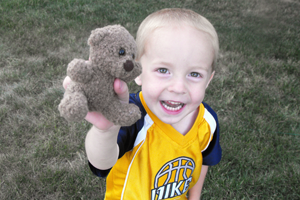 “A large number of people in our society believe children should not be exposed to death. Parents often are not sure if they should include their child/ren at the time of loss, at the funeral or in the commemorating in the years to come. Parents know their children better than anyone so these decisions are very personal and what is right for one many not feel right for another.”
“A large number of people in our society believe children should not be exposed to death. Parents often are not sure if they should include their child/ren at the time of loss, at the funeral or in the commemorating in the years to come. Parents know their children better than anyone so these decisions are very personal and what is right for one many not feel right for another.”
“The parents of children who experience early pregnancy loss may find it more difficult to commemorate this life as often the only tangible evidence they have is an ultrasound picture. Some commemorative ideas that families experiencing early losses have used are organizing a memorial service at their church, participating in a quarterly group burial service, or having a private intimate service with their family. Others have planted a tree or designed a garden. Some families find connecting to a specific object such as a teddy bear or a piece of jewelry for themselves and the children is meaningful.”
 “Children will not forget their experience of having a baby brother or sister die. However, they will be able to lead productive, wonderful lives if given permission to openly mourn and have their feelings validated. They need support and understanding of their grief in order to be able to integrate this loss into their lives. As they move through each developmental stage, new questions may be asked, and they may need more in-depth answers. This does not mean they are regressing, but rather they are maturing and need to clarify some issues in their hearts and minds. Some children adjust to this loss easier and others need extra help with a support group or therapist.”
“Children will not forget their experience of having a baby brother or sister die. However, they will be able to lead productive, wonderful lives if given permission to openly mourn and have their feelings validated. They need support and understanding of their grief in order to be able to integrate this loss into their lives. As they move through each developmental stage, new questions may be asked, and they may need more in-depth answers. This does not mean they are regressing, but rather they are maturing and need to clarify some issues in their hearts and minds. Some children adjust to this loss easier and others need extra help with a support group or therapist.”
“In closing, your children are often your greatest source of comfort. Their openness and nonjudgmental attitudes may allow you to express yourself and give permission to talk about
your baby. Bereaved children have learned about grief at often a very young age. However,
often with a grief experience, growth does occur and gifts such as compassion and kindness
follow. These may be the best of many gifts their brother or sister has left them.”
Recommended Reading
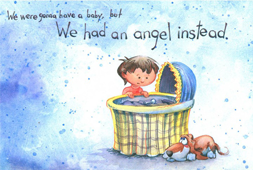 We Were Gonna Have a Baby, But We Had an Angel Instead
We Were Gonna Have a Baby, But We Had an Angel Instead
by Pat Schwiebert
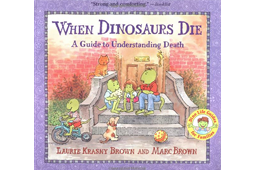 When Dinosaurs Die
When Dinosaurs Die
by Laurie Krasny Brown
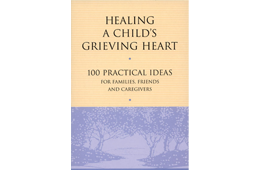 Healing a Child’s Grieving Heart: 100 Practical Ideas for Families, Friends, and Caregivers
Healing a Child’s Grieving Heart: 100 Practical Ideas for Families, Friends, and Caregiversby Alan D. Wolfelt, PhD
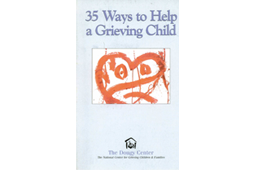 35 Way to Help a Grieving Child
35 Way to Help a Grieving Child
by Dougy Center Staff

